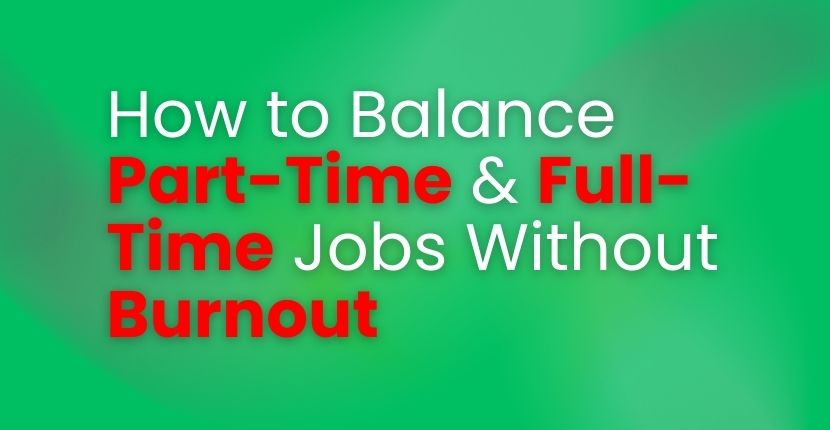How to Balance Part-Time and Full-Time Jobs Without Burnout
Introduction
In today’s world, more and more people are working both part-time and full-time jobs. Some do it to pay off debt or save money, others to gain experience or follow a passion. Having two jobs can be rewarding—it brings in extra income, new skills, and fresh opportunities. But it also comes with one big challenge: burnout.
The real secret is learning how to manage your time, energy, and priorities so you can succeed at work and still enjoy your personal life. This guide will show you practical ways to balance both jobs without losing your health, happiness, or focus.
Why People Take on Multiple Jobs
Balancing two jobs may sound stressful, but the reasons behind it are often motivating:
- Extra income for bills, savings, or lifestyle goals.
- Career growth through learning new skills in different industries.
- Passion projects that provide creativity or fulfillment.
- Flexibility to explore new roles without quitting a stable job.
While the benefits are real, it’s important to recognize the risks that come with working too much.
The Hidden Risks of Overworking
Managing two jobs isn’t just about time—it’s about energy. Without balance, you may face:
- Exhaustion – long hours lead to constant tiredness.
- Stress and anxiety – juggling responsibilities drains mental health.
- Low productivity – fatigue reduces focus and increases mistakes.
- Relationship gaps – little time left for friends, family, or hobbies.
Understanding these risks helps you take steps to prevent burnout before it happens.
Set Clear Goals First
The key to balance is clarity. Ask yourself:
- Am I working two jobs mainly for financial security?
- Is one role helping me build a long-term career?
- Is my part-time job a creative outlet or a passion project?
When you know your goals, it’s easier to decide which job deserves more of your time and energy.
Create a Smart Schedule
Time is the biggest challenge when balancing two jobs. The solution? Structure.
- Use time blocking to assign hours to each job.
- Keep track with tools like Google Calendar or Notion.
- Always include short breaks to avoid mental overload.
When you control your schedule, you control your stress.
Boost Productivity With Time Management Tricks
Smart workers know how to use their hours wisely. Some proven hacks include:
- Pomodoro method – 25 minutes of work, 5 minutes rest.
- Eisenhower Matrix – separate urgent tasks from non-essential ones.
- Task batching – group similar tasks together to save energy.
These techniques help you finish more work in less time.
Set Boundaries and Communicate Clearly
One common reason for burnout is overcommitting. To avoid it:
- Be clear about your availability with employers.
- Say no politely when extra work affects your health.
- Keep separate spaces (if possible) for each job.
Boundaries protect your mental health and ensure neither job takes over your life.
Take Care of Your Health First
Without good health, you won’t be able to handle two jobs for long. Make this a priority:
- Sleep 7–8 hours every night.
- Eat nutritious meals to fuel your body.
- Move daily—even a short walk boosts energy.
- Practice stress relief through meditation, journaling, or fun hobbies.
Healthy habits give you the energy to keep going without burning out.
Look for Flexible and Remote Options
One way to make life easier is to choose jobs that fit your lifestyle.
- Remote work saves commuting time.
- Freelance roles let you pick your workload.
- Shift-based jobs can be scheduled around your main career.
Flexibility makes balancing both roles far more manageable.
Don’t Forget Downtime
Working nonstop doesn’t mean you’re successful—it means you’re headed for burnout. Always schedule downtime:
- Take a weekly rest day when possible.
- Spend quality time with family and friends.
- Do activities that bring you joy outside of work.
Remember, rest is a form of productivity.
Know When to Step Back
Sometimes, the smartest decision is recognizing when two jobs are too much. Warning signs include:
- Feeling tired even after sleeping.
- Struggling to perform well in both jobs.
- Losing motivation or personal time completely.
In such cases, consider reducing hours or focusing on the role that aligns most with your long-term goals.
Conclusion
Working part-time and full-time jobs together isn’t easy, but it’s possible with smart planning, boundaries, and a focus on health. By using your time wisely and staying clear on your goals, you can enjoy extra income and career growth—without draining your energy.
👉 Looking for your next opportunity? Explore our Latest Job Listings and find the role that fits your lifestyle today!


